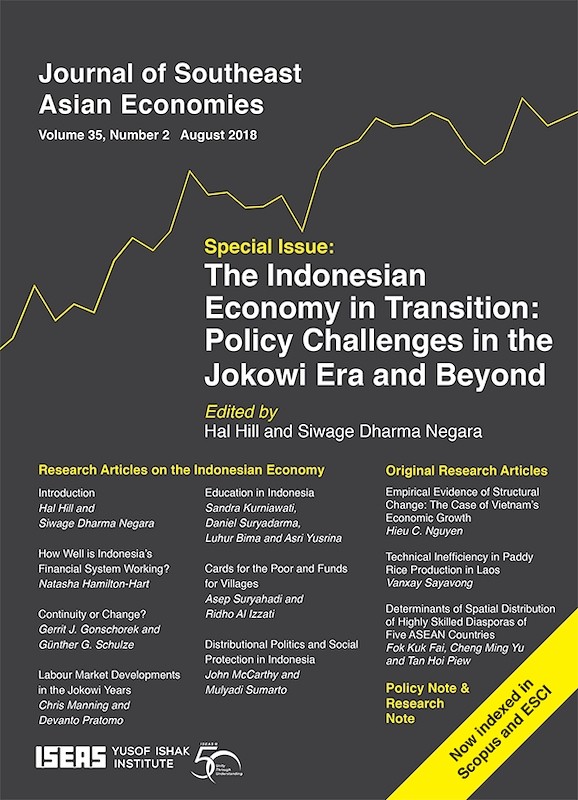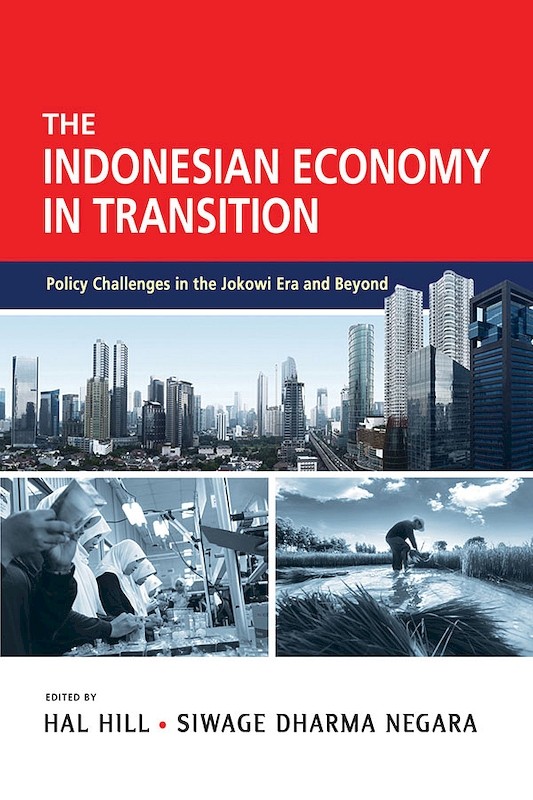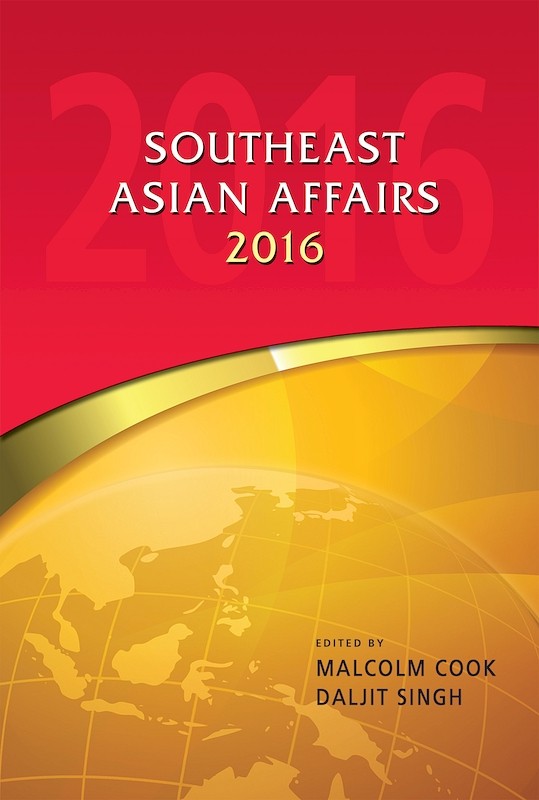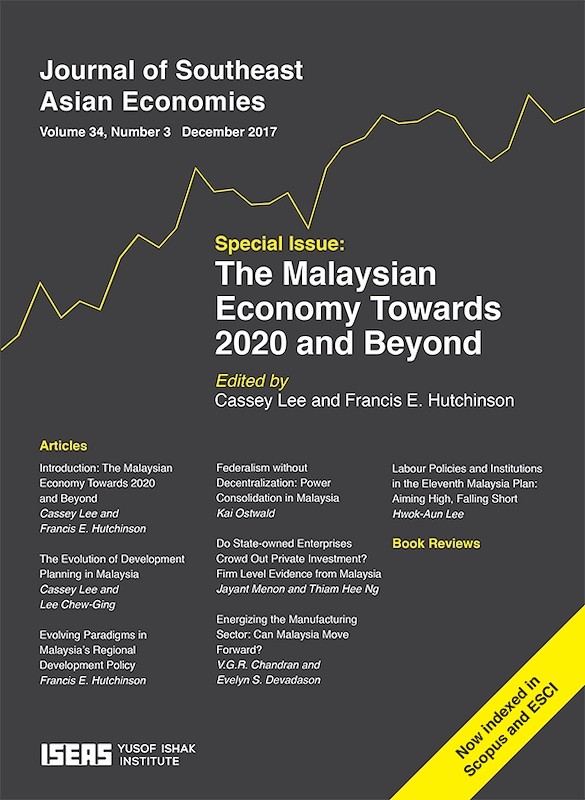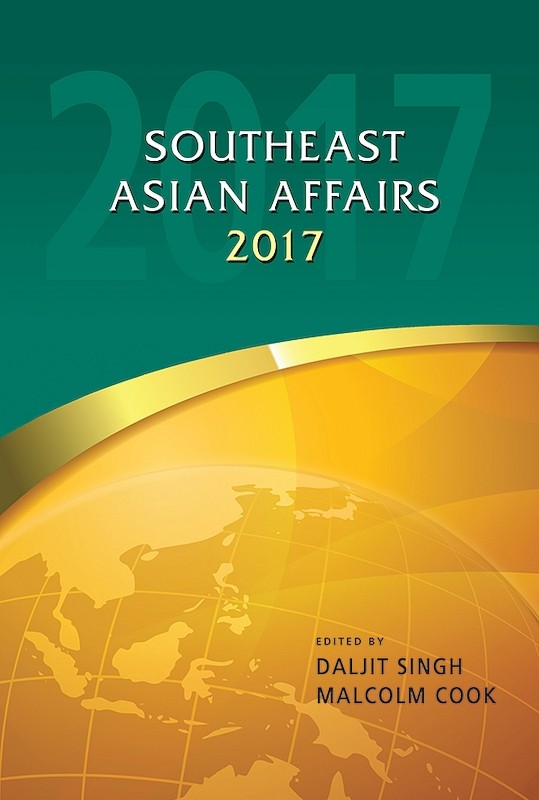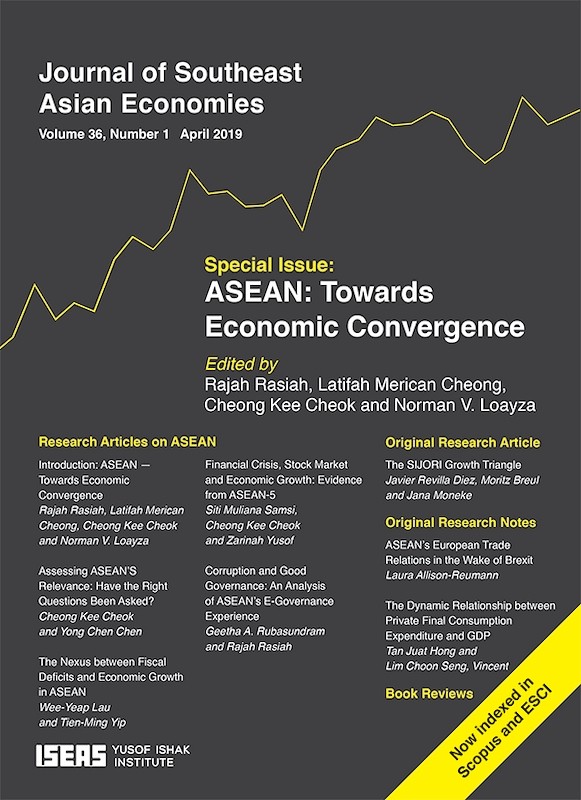Journal of Southeast Asian Economies Vol. 35/3 (Dec 2018). Special Issue on "The Indonesian Economy in Transition: Policy Challenges in the Jokowi Era and Beyond" (Part II)
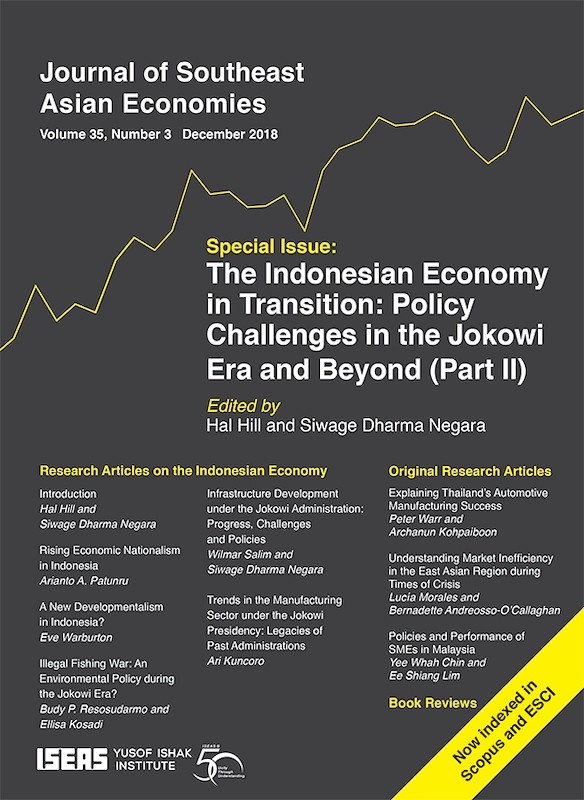
Date of publication:
December 2018
Publisher:
ISEAS – Yusof Ishak Institute
Number of pages:
159
Code:
AE35/3
Contents
-
Journal of Southeast Asian Economies Vol. 35/3 (Dec 2018). Special Issue on "The Indonesian Economy in Transition: Policy Challenges in the Jokowi Era and Beyond" (Part II)
[Whole Publication, ISSN: 23395206] -
Preliminary pages
- THE INDONESIAN ECONOMY IN TRANSITION
-
Introduction: The Indonesian Economy in Transition — Policy Challenges in the Jokowi Era and Beyond (Part II), by Hal Hill, Siwage Dharma Negara, authors
-
2. Rising Economic Nationalism in Indonesia, by Arianto Patunru, author see abstractThis paper discusses rising economic nationalism in Indonesia. The findings suggest that protectionism has started to make its way back into the country since the early 2000s. Despite some reform initiatives, economic nationalism has amplified under the current administration, and might continue to do so in the near future. The political-economic factors that explain the re-emergence of protectionist measures under Joko Widodo’s presidency form the body of this study. Using the case studies of fuel and rice, it shows that while economic nationalism might prove to be politically rewarding, its detrimental impact on the poor cannot be ignored. It is therefore in Indonesia’s best interest to resist the continuing push for protectionist policies.
-
3. A New Developmentalism in Indonesia?, by Eve Warburton, author see abstractOver the course of the past decade, Indonesia’s economic planning has become increasingly developmentalist in orientation. While aspects of this model have deep roots in the country’s history, a more self-conscious developmentalist agenda re-emerged during President Susilo Bambang Yudhoyono’s second term in office (2009–14). This paper suggests that under President Joko Widodo a new developmentalism has crystallized further and, arguably, become a defining feature of Indonesia’s political economy. To advance this argument, the paper draws upon studies of the “new developmentalism” in middle-income and emerging economies. This new developmentalism is characterized by a normative commitment to an activist state that can engineer fast economic growth, direct industrial upgrading, and ensure economic redistribution. However, developmental agendas should be distinguished from developmental outcomes. For Indonesia, state-led programmes for industrialization and inclusive economic growth have often fallen short. This study highlights some structural constraints upon the new developmentalism, with a particular focus upon politics. Specifically, it identifies patronage and clientelism as fundamental challenges to an effective state-led developmental model. Successive Indonesian governments, Jokowi’s included, have taken a conservative approach to the political problems that undermine their developmental goals.
-
4. Illegal Fishing War: An Environmental Policy during the Jokowi Era?, by Budy P. Resosudarmo, Ellisa Kosadi, authors see abstractIndonesia’s environmental issues are immense. Scholars have argued that it is time for the country to start seriously dealing with this challenge. President Susilo Bambang Yudhoyono clearly showed the world that he was willing to tackle the problem by making climate change policy a top national priority. However, it remains to be seen whether President Joko Widodo is also willing to do so, even though his controversial illegal fishing war has attracted considerable domestic and international media attention. This paper argues that, in general, the current administration has not significantly helped manage Indonesia’s environment in a better way. Specifically, the role of the war on reducing the extent of illegal fishing in Indonesia is difficult to determine. The findings of this article suggest that the impact on the national formal fishery sector has been relatively small. The impact might be significant at a local level, but only in a few areas in Eastern Indonesia, which could negatively affect large fishing companies but benefit small fishers.
-
5. Infrastructure Development under the Jokowi Administration: Progress, Challenges and Policies, by Wilmar Salim, Siwage Dharma Negara, authors see abstractIn any emerging nation, efficient infrastructure holds the key to economic and social development. In the case of Indonesia, however, decades of under-investment and poor asset management have left the country with a significant infrastructure deficit. This paper explores the key problems facing infrastructure development in Indonesia since the Yudhoyono era. The current administration aims to tackle this challenge and improve the competitiveness of the Indonesian economy. Compared to the previous administration, the incumbent government has taken a more pragmatic approach to achieve its goals. One major policy has been to shift budget allocations away from fuel subsidies and towards infrastructure development. This has also been accompanied by continued efforts to reform regulatory and institutional frameworks. Despite these measures, the overall progress of Jokowi’s infrastructure development has not been as smooth as expected. Limited resources and capacity mean that the administration needs to re-evaluate the number of national strategic initiatives and be more selective in prioritizing infrastructure projects. Moreover, the national strategic projects must be linked to larger development plans with longer time-frame, such as the National Spatial Plan and sectoral master plans in order to achieve integrated regional development.
-
6. Trends in the Manufacturing Sector under the Jokowi Presidency: Legacies of Past Administrations, by Ari Kuncoro, author see abstractIndonesia’s manufacturing sector has been transformed from being a driver of economic growth to a sector that is almost completely dependent on the growth of domestic demand. The commodity boom that took place between 2005 and 2012 has resulted in a Dutch disease situation in which the expansion of one sector has reduced the incentive for manufacturing to export, given that domestic demand is readily available. Recent data show that Indonesian manufacturing has been lagging behind its nearest neighbours in reaping the benefits of international value chains. Being more inward-looking, manufacturing now depends on other sectors to generate growth. While some industries such as textiles and automotive are still promising, in order to keep the momentum going on manufacturing exports, Indonesia needs additional reforms including: better logistics; fewer non-tariff barriers; and improved human resource quality.
- ORIGINAL RESEARCH ARTICLES
-
7. Explaining Thailand’s Automotive Manufacturing Success, by Peter Warr, Archanun Kohpaiboon, authors see abstractThis paper argues that the success of Thailand’s export-oriented automotive industry was based on three factors: first, the substantial public investment in productivity-raising port facilities and related infrastructure in the 1990s that constituted the Eastern Seaboard economic corridor; second, exchange rate depreciation that accompanied the 1997–98 Asian Financial Crisis. Jointly, these two factors made manufacturing production for export more profitable. The third was a combination of two key policy changes adopted by the Thai government shortly after the Crisis and partly in response to it — removing restrictions on foreign ownership and abolition of local content requirements.
-
8. Understanding Market Inefficiency in the East Asian Region during Times of Crisis, by Lucía Morales, Bernadette Andreosso-O'Callaghan, authors see abstractThe study of financial market efficiency has important implications in terms of global macroeconomic stability. The case of six selected East Asian stock markets (China, Japan, Hong Kong, Malaysia, Singapore and South Korea) during the Asian Financial Crisis (AFC) and Global Financial Crisis (GFC) is analysed here using a battery of well-known econometric techniques that starts with traditional unit root testing for random walk behaviour. The six countries were selected on the basis of market capitalization to offer insights into the behaviour of the most relevant markets in the region. The results show that during both crises, these markets exhibited significant inefficiencies. This is shown by the fact that positive correlations characterized markets returns behaviour in general, except for South Korea and Hong Kong, during the GFC. Of particular note is the case of China; its stock markets suffered losses and high volatility during the GFC and exhibited increasing correlations with other stock markets in the region, showing progressive levels of integration within the region and more exposure to global events.
-
9. Policies and Performance of SMEs in Malaysia, by Chin Yee Whah, Lim Ee Shiang, authors see abstractThis study aims to achieve two major objectives. First, to assess policies and initiatives implemented for the development of Malaysian SMEs, from the Eighth Malaysia Plan (8MP) to the current Eleventh Malaysia Plan (11MP), and under the SME Masterplan (2012–20). The second goal is to examine the performance and contribution of these SMEs to the economy. The study provides a critical analysis of the adequacy of the 11MP for SME development and seeks to determine whether its targeted goals can actually be achieved by 2020. It utilizes content analysis and the notion of embeddedness to examine an enormous volume of fragmented text from the existing body of government published reports available on the topic of SME development and the way forward.
- BOOK REVIEWS
-
BOOK REVIEW: Southeast Asia and China: A Contest in Mutual Socialization, edited by Lowell Dittmer and Ngeow Chow Bing., by Sanchita Basu Das, author
-
BOOK REVIEW: Creating Good and Clean Government: Performance Audit in Indonesia, by Paul Nicoll, by Harun Harun, author

